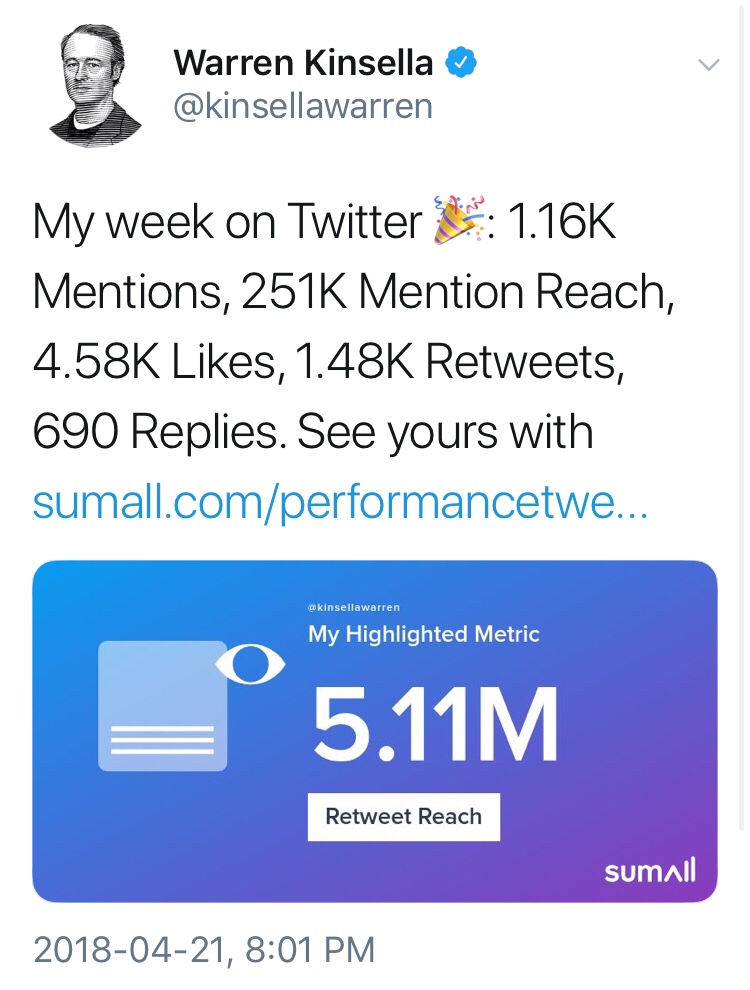Adler-Kinsella: on Gordie – and on the week that was
Here:
Here:
At Carleton, my closest political pals were James Villeneuve, Bob Richardson, Jim Watson and Gordie Brown. I haven’t stayed in touch with the other guys as much, over the years, but I always did with Gordie. Despite our different political allegiances, despite living in different places, we always remained very close friends. He was loyal to me, and me to him.
I last saw him on November 30, when he came to my Recipe for Hate book launch in Ottawa. He was the only Ottawa friend who remembered and who came. That was the kind of guy he was.
A few days ago, Gordie called me, after visiting James in L.A. I didn’t call him back. I kept putting it off. I was busy.
This morning, Gordie died of a massive heart attack.
I am in shock and don’t know what to say, other than just two things. One, I loved him as a friend and will miss him as a brother.
Two, when you reach a certain age, and your friends call, call them back.
My buddy @gordbrown dropped by @OctopusBooks for the #recipeforhate signing! Still a few left! @dundurnpress @XPUNKBOOK pic.twitter.com/MrpN4NnmvW
— Warren Kinsella (@kinsellawarren) November 30, 2017
It’s been a horrible week.
On this week’s show, Charles and I talk about the Yonge Street massacre – and also the rapist Bill Cosby, and related gender issues.
From next week’s column in the Hill Times.
Twenty-nine years earlier: it is around four o’clock in the afternoon, on a bitterly-cold Wednesday. I am a lawyer at an Ottawa valley law firm, and volunteering for Jean Chretien, who is also working as a lawyer, at the firm next door. We are preparing for Chretien’s announcement, in just over a month, that he is going to seek the Liberal Party leadership. And then the news starts to trickle in.
A “man” with a rifle has started shooting up the Ecole Polytechnique in Montreal. He has wounded dozens of people – and he has slaughtered 14 young women. Because they are women.
Stunned, we listened to Michael Enright interview a student at the school, Genvieve Cauden, on CBC Radio. What happened, Enright asks her.
“We all go on the floor and we go under the desks. After, he shot people. He shot girls. I just closed my ears and closed my eyes. I didn’t want to know what’s going on. I received a shot in my head,” and then she paused. “But it’s not bad. It’s OK.”
“It just grazed your head,” Enright says.
“Yeah, that’s it,” Cauden says. “After, the guy killed himself.”
The guy in Toronto, who was apparently following the precisely same Satanic, women-hating manifesto, didn’t kill himself. As the entire world saw, he wanted a Toronto cop to do that for him. The cop – amazingly, bravely – refused, and arrested the alleged mass-murderer without firing a shot.
After his arrest, the usual bullshit happened. Politicians offering “thoughts and prayers,” instead of actual policies and measures to prevent something like Ecole Polytechnique and Yonge Street from happening again. Online losers, sitting in their mom’s basement and calling it Muslim terrorism – when it was decidedly neither. Media lavishing attention on the alleged killer, instead of his many victims.
The usual bullshit.
I am active on Twitter. I admit it.
Some people apparently read me on Twitter, too, and I (mostly) enjoy interacting with them. Here’s what the last week has been like. Lots of interaction.

A “reach” of over five million. I don’t know what that means, exactly, but I know this: me and others are clearly drawn to Twitter.
But I’m repulsed by it, too. Perhaps you are, as well. Because, you know, Twitter is also often terrible.
Its creator, Jack Dorsey, has a more benign take on President Pisstape’s preferred platform, naturally. Speaking of Twitter’s beginnings, Dorsey says “we came across the word ‘twitter’, and it was just perfect. The definition was ‘a short burst of inconsequential information,’ and ‘chirps from birds’. And that’s exactly what the product was.”
Well, no.
In my experience – and in the experience of not a few others – Twitter is often anything but inconsequential. It is the place where neo-Nazis and white supremacists go to spew hate and frighten minorities. It is where misogynists come to threaten and demean women – with dark promises of rape and murder and blackmail. It is where the mob is, most days, digitized torches and pitchforks at the ready.
Facebook is for falsification. Twitter is for defamation.
Case in point: a proud Beaches-area neo-Nazi named James Sears publishes a “newspaper” against which we have been doing battle for years. We have had some successes, but we aren’t nearly done yet.
Sears also has a Twitter account, under the name “Dimitri the Lover.” He fancies himself one – although the law sees him differently, having charged him in the past for sexually assaulting women.
I block Sears’ Twitter account, but I also periodically scan it for material that may be useful in the five legal actions we’ve initiated against him and his Hitlerite winged monkeys (two criminal, two civil and one administrative). A few weeks ago, I found a Sears tweet that contained the foulest expressions of anti-Semitism and race hatred. I won’t reprise it here.
I reported it to Twitter, however. I pointed out – yet again – that they had become a willfully-blind accomplice to the dissemination of Naziism. I demanded they remove it. They speedily acknowledged receiving my complaint.
This weekend, I finally received a brief notice from Twitter that they’d dealt with my complaint, here:

Wow. Had they finally kicked Sears off Twitter? Really? I went over to Sears’ account and this is what I found.

A birthday tribute to Adolf Hitler. Complete with swastikas, a declaration that the Holocaust was a hoax, and “Hitler was right.”
Twitter, with its “chirpy” name and “inconsequential” bits of information, is neither chirpy nor inconsequential. It is the haters’ village square. It is the place where subhumans like James Sears have found their voice. With impunity.
Dorsey shouldn’t have called it Twitter.
He should have called it Sewer, because that’s what it so often is.
Did my usual Thursday thing with Charles, and it was illuminating, as usual. We discussed drugs and sexual harassment and even found room to squeeze in a few laughs. Check it out.
Story by QP Briefing, which has been repeatedly breaking stories lately, here:
When PC Leader Doug Ford was the only party leader who declined to participate in a Toronto debate organized by Black community organizers, the Liberals criticized him as being out-of-touch.
In social media copy that was also shared by some Liberal riding accounts, the party stated: “Doug Ford says he ‘loves the blacks’ but wasn’t at the Town Hall tonight… Did Doug Ford deliberately choose to ignore the black community leaders debate? #ONBlackVote #WhereIsDoug #onpoli”
There is one problem with this statement: QP Briefing cannot find any record of Doug claiming that he “loves the Blacks,” a phrasing that would be considered offensive.
We asked the Liberal Party to provide a reference to where we could find this quotation, and they conceded it was an error.
“It appears the tweet accidentally referred to Doug when it should have said Trump,” David Clarke, executive director of the Ontario Liberal Party, said in an e-mail on Monday night. “We’ve corrected the error and are working to ensure accuracy to re-issue it.”
Best part of the story? They then went on to issue a new tweet, which contained a new error.
None of this would be happening if Warren Kinsella was still alive.
Abacus (with whom Daisy proudly does work, full disclosure, etc.) has a fascinating poll out about who is in the so-called Ford Nation, what they think, why they think it, etc. etc. It’s here.
Now, in recent weeks/months, some folks have been asking me: “Warren, why don’t you hate Doug Ford as much as me and my friends in the Annex do? Why do you say nice things about him?”
Well, two reasons. One, I like him. I’ve written about why, here. When I was being used as a human piñata, Doug was the first guy to call me. In politics, you tend to remember calls like that.
Two, the claim that Doug Ford is Donald Trump is fucking idiotic. The Doug Ford I know is readily seen here – I encourage you to watch all of it – and he bears no resemblance, in any way, to the Mango Mussolini. (Some days, as I told Evan Solomon on his CFRA show yesterday, I’m not even sure Doug is an ideological conservative.)
Why is Doug winning? Lots of reasons. Weariness with the Ontario Liberals. Suspicion about the Ontario New Democrats plans. But, mainly, I think it’s because his opponents have greatly underestimated him. I used to work for a guy, remember, who was underestimated all the time.
And Doug is sort of like that guy, that little guy from Shawinigan. And, he’s like Ralph Klein, Mel Lastman, René Lévesque, Jean Chrétien. He’s like all of those populist-type politicians who are anti-politicians. He doesn’t look a matinee idol, he doesn’t use perfect grammar, he sometimes (and often) says the wrong thing.
And people like him/them for it. They don’t like Doug despite his failings – they like him because of his failings. Get it?
Don’t believe me? Check out this Abacus slide. It tells why he is ahead, and why he is likely to stay there.
Comments are open.